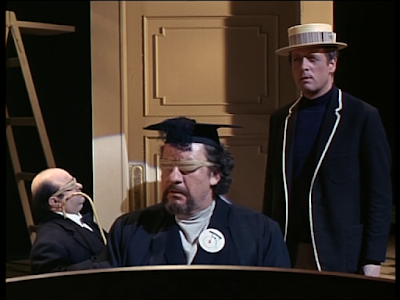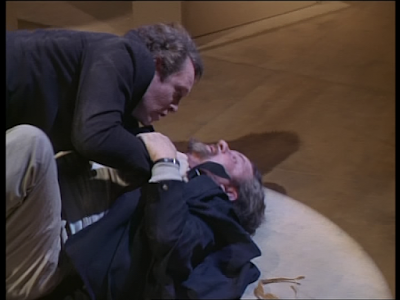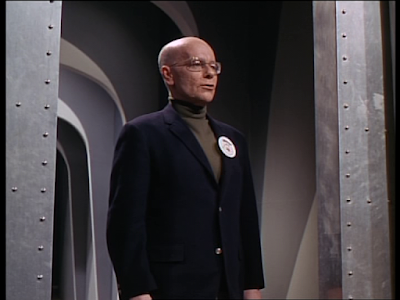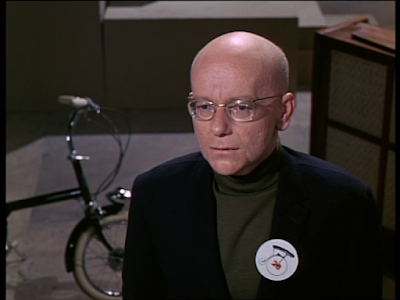To The Absolute Degree
Written by Patrick McGoohan
Directed by Patrick McGoohan
No.2 as headmaster "Society is a place where people exist together. That is civilisation. The lone wolf belongs to the wilderness. You must not grow up to be a lone wolf. You must conform!"
The No.2 from The Chimes of Big Ben (Leo McKern) returns to The Village. Dissatisfied with the lack of progress in breaking No.6 while he was gone, he demands that he be allowed to use the ultimate force, degree absolute. This entails both of them being locked for a week in The Embryo Room, regressing No.6 back to childhood, and then through Regressive therapy and psychodramas take him through his life to find out why he resigned, and whether his nature can ever be moulded to conform to The Village.
There is a danger though. No.6 could die or go insane, and therefore be lost forever from The Village. Or by the psychoanalytic process known as transference, No.2 might change places and become the patient, and lose, or worse, die. If No.6 can resist and defeat No.2 then the ultimate prize awaits. Number One!
This was the sixth episode produced, and was intended to end the first series of 13 episodes. When Pat and Lew Grade (head of ITC) agreed to cancel season 2 and add four more episodes, it was decided that this would be moved back to be the penultimate 16th episode, thus leading into the final 17th episode, yet to be written by Pat, and the resolution of the story. This was possible as the show hadn't yet started broadcasting. This is also the reason why the incidental music specifically written and recorded for this episode (see below) seems so familiar, it was used for about half the series.
The script, by necessity written by Pat, as he was supposedly the only one who knew what the whole thing was about, uses the psychoanalytic technique of regression, with a literary nod to Shakespeare's Seven Ages of Man speech from As You Like It. This is reinforced by the nursery look and name of the Embryo Room. There is use of nursery rhymes and play equipment, toys, like rattles, rocking horse, playpen and blackboard. It could almost be Play School. So there's a use of Regression therapy as well as psychodramas, where No.2 would assume various authority roles in No.6's young life such as father, headmaster, leading into adulthood as employer, spymaster, and judge. There's the familiar structure of society such as childhood, school, work, then more specifically spy and War record (though No.6 would have been too young for WWII surely, though he might have joined up when 18 in March 1944?). Plus games of conflict, such as boxing and fencing, and the authority of the law with the court case.
At school, No.2 calls No.6 into his headmaster's room to get No.6 to confess as to who was talking in class. When he refuses, No.2 says "That is cowardice" to which No.6 replies "It's honour, sir" "We don't talk about such things" "You should teach it, sir". This neatly represents the key difference between the two, and thus The Prisoner and The Village. No.6 won't conform by betraying other people as a matter of honour. Another key speech made by No.2 as the headmaster is the one quoted above. "Society is a place where people exist together. That is civilisation. The lone wolf belongs to the wilderness. You must not grow up to be a lone wolf. You must conform!". Actually, this is neither a contentious or negative view, lone wolves are looked upon askance by members of society, and all humans live in societal structures, it's how they survive and flourish. Interestingly, Lone Wolf was the working title for Danger Man.
The script by McGoohan is essentially a two handed play, with the ever mute Butler (Angelo getting a special credit for this episode) appearing as No.2's accomplice and, at the end, Peter Swanwick as The Supervisor. It's also an intense play, as all psychological studies of breakdown and interrogation are. It could have been written by Pinter, it's that good as a short 40 minute play. There's only the odd moment of gibberish, such as the repetition of POP! McGoohan directs very well, moving from intense close-ups during heightened moments of tension, then moving back to mid-shots for the many master/subject speeches. There's also some attempts to see if No.6 will overstep the mark and actually kill, and there are also some moments where No.6 comes close to revealing why he left, especially in the climactic living quarters room, where he says it was for peace of mind. Pat nicely judges the ebbs and flows of such a process, both in terms of writing and directing, so it never descends into either psychobabble or a histrionic shouting match.
For such an episode to work you need actors of the highest calibre and we get them here. Both Pat and Leo McKern are superb actors, strong and forceful but capable of subtle characterisation, and they're at the heights of their powers here. Indeed, it has been reported that both actors got so embroiled in their roles that they occasionally lost themselves. Actually, Leo became so ill from the strain and exertions that he had to take a few days off, and production was temporarily halted. As a two-hander there were no other scenes that could be shot, and both actors would have had no respite from the provisional two week shoot.
And so we come to The End. Vanquishing No.2 through sheer force of will, at the end of a week The Supervisor asks him what he wants. There's only one reply possible. "Number One". "I'll take you" he says, and they all march off to next week, to the final episode, to their destiny. This is a superb episode, strongly written and acted, which stays in the memory long after watching. I bet the audience of 1968 couldn't wait until next week, after four months of trial, near escapes, and near breaking points. Number One.
Incidental Music
The Village rating (out of 6): No.6
The Prisoner .................................................................. PATRICK McGOOHAN
Number Two .................................................................. LEO McKERN
The Butler ..................................................................... ANGELO MUSCAT
Supervisor..................................................................... PETER SWANWICK
Umbrella Man ............................................................... JOHN CAZABON
[Number 86 ................................................................... John Maxim (scene deleted)]













































































Comments
Post a Comment
All comments welcome, you don't need a Google account, but trolls beware, all comments are moderated.